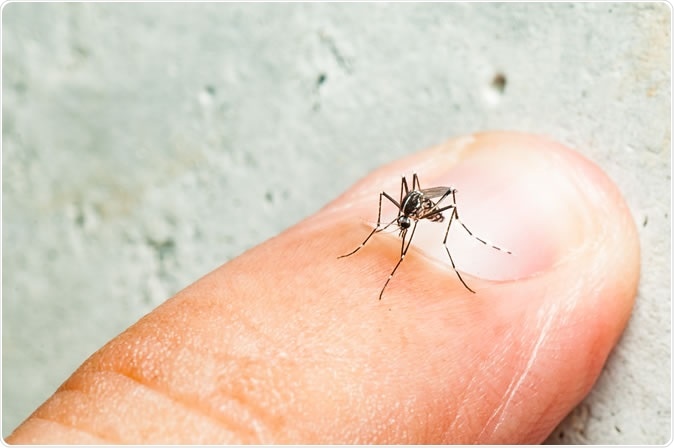Officials have confirmed the initial success with trials of Dengue vaccine. Dengue, a viral disease borne by mosquitoes is considered to be one of the top ten health threats says the world Health Organization (WHO). Since the beginning of the outbreaks and the hundreds of deaths due to this infection, researchers have been on the lookout for vaccines to prevent this infection.
Now, a vaccine preparation called TAK-003 has shown promise in protecting the immunized individuals against the infection. The results of the study talking about the results of the vaccine trial were published this week in the latest issue of the New England Journal of Medicine. The clinical trial is called Tides and the study is titled, “Efficacy of a Tetravalent Dengue Vaccine in Healthy Children and Adolescents.”
According to the WHO there has been an alarming rise in the number of cases of dengue fever across the globe. There have been 100 million cases reported last year alone. Since 1970, there has been a thirty fold rise in the number of cases says the WHO. Dengue fever is typically characterized by flu like symptoms and intense muscle pain and headaches. It is sometimes called “break-bone fever”. The disease may become severe and lead to haemorrhage and even death with fall in platelet counts say experts. As of now there are no drugs that are effective in the treatment of this infection. Management of the infection includes hydration and fever control and other supportive measures. Recovery is seen within a week in most individuals but the infection can lead to organ failure, life threatening haemorrhage and even death in some individuals.
The virus is carried from an infected person to another by the Aedes aegypti mosquito that frequently grows in the tropical, warm and humid climates. Countries around this region are one of the worst sufferers says the WHO. Brazil this year till now has seen over 2 million cases of dengue and other nations afflicted by this condition include Bangladesh, Indonesia, Philippines etc.

Aedes mosquito. Image Credit: Aedes aegypti mosquito / Shutterstock
The latest dengue vaccine TAK-003 is manufactured by the Takeda Pharmaceutical Company. Derek Wallace from Takeda said in a statement, “This is the fastest-spreading mosquito-borne viral disease on the planet. Dengue is a very important disease across a large part of the world. Nearly half the world's population is at risk of dengue. There are nearly 400 million infections annually, and about 100 million of those are symptomatic.”
Wallace spoke about the results of the vaccine trial saying, “We're thrilled with the results.” The vaccine trial had started in 2016, he said and it included 20,071 people of age between 4 and 16 years. The trial covered 26 study sites across seven nations in Asia and Latin America that were affected by dengue. The children were divided into two groups in the ratio of 2:1 and one group (the larger one) received two doses of the new vaccine and the other received two doses of placebo, three months apart.
Results from the vaccine trial showed that the vaccine was 80 percent effective in preventing dengue infections among the included participants and it was 95 percent effective in preventing severe dengue said the researchers. Wallace added, “A vaccine efficacy of 80% has the potential to have a massive impact on the significant public health burden of dengue.” The efficacy of the vaccine against one of the strains of Dengue (DENV-2) was 97.7 percent while for the other two strains was 73.7 percent and 62.6 percent respectively for DENV-1 and DENV-3. No data was obtained for the fourth strain DENV-4.
According to Stephen Waterman, the head of the U.S. Centers for Disease Control and Prevention's Dengue Branch, this study could be a game changer. He said in a statement, “We are not getting a better handle on [dengue] worldwide. There's been a steady trend of an increasing number of cases.” He explained the developing an effective vaccine against dengue has been difficult owing to the four different strains of the virus, each of which having a separate antigenic profile. He said, “Because of the four different viruses involved, you need to package four different viruses into one vaccine.” He cautioned against reading too much into the Takeda study yet and says that the full trial data and a longer period of study might be able to prove TAK-003’s actual worth.
Sanofi had made their dengue vaccine called Dengvaxia which was trialled in 2015. Filipino children were vaccinated with Dengvaxia and it was seen that the vaccine made the dengue more severe. According to Wallace, TAK-003 is different from Dengvaxia. He explained the Dengvaxia was made from a strain of yellow fever virus while TAK-003 is made from strains of weakened Dengue virus. He said, “We have not seen any evidence of an increase in severe dengue as a result of vaccination in this study, but it is important that we continue to look at this over a longer period of time.” This study monitoring children vaccinated with the preparation would continue, he assured, for several years to see the efficacy of the vaccine.
This study was funded by Takeda Vaccines. The company has opened a manufacturing unit for TAK-003 in Germany this week.
Journal reference:
Shibadas Biswal, M.D., Humberto Reynales, M.D., Ph.D., Xavier Saez-Llorens, M.D., Pio Lopez, M.D., Charissa Borja-Tabora, M.D., Pope Kosalaraksa, M.D., Chukiat Sirivichayakul, M.D., Veerachai Watanaveeradej, M.D., Luis Rivera, M.D., Felix Espinoza, M.D., LakKumar Fernando, M.D., Reynaldo Dietze, M.D., et al., for the TIDES Study Group, Efficacy of a Tetravalent Dengue Vaccine in Healthy Children and Adolescents, New England Journal of Medicine, 10.1056/NEJMoa1903869, https://www.nejm.org/doi/full/10.1056/NEJMoa1903869